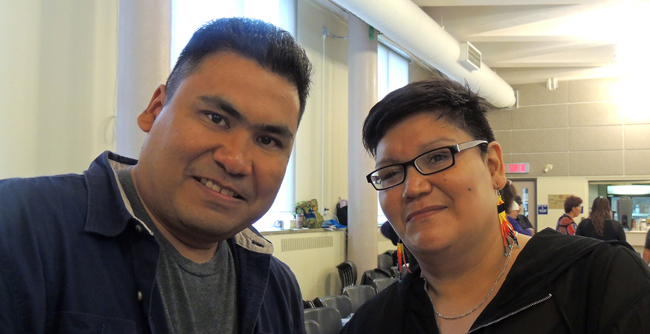Indigenous adoptees find strength in each other

By Christine Smith (McFarlane)
OTTAWA – Sixties Scoop and foster care survivors converged Ottawa Sept. 20-21 to the Indigenous Adoptee Gathering entitled: Bi-giwen, which in Algonquin means “coming home”.
The two-day event was aimed at serving as a turning point in the lives and direction of some 150 Indigenous adoptees and foster care survivors. who attended the event.
Up to 20,000 First Nations and Metis children from the late 1950s up to the 1980s have been impacted by the colonial child welfare policy that saw thousands who were forcibly and illegally taken from their ancestral territories and scattered throughout Canada, the United States and Europe in non-Indigenous households.
Like many survivors in the Indian Residential School System, many Sixties Scoop adoptees and foster care survivors endured tremendous violence, abuse and racism in their households as they share a common experience of loss of language, ceremony, familiarity of extended family and connection to their identity through the land.
Headquartered in Ottawa, the Indigenous Adoptee Gathering Committee is a local group of First Nations and Metis adoptee and foster care survivors who recognized the need to create a forum to let Sixties Scoop survivors express their stories and to learn from one another survival strategies as a result of their removal and displacement into non-Indigenous families across Canada, the U.S. and Europe.
Workshops included facilitators who spokeon such topics as: finding your way back to the centre of the circle, 60’s Scoop trauma-our spiritual way, adoption, identity and empowerment, and sharing circles where participants were able to gather and tell their stories.
One adoptee, Kirk Beaver, 34, originally from Bigstone Cree Nation, Alberta is currently a third year student at the University of Toronto.
“I came to the gathering because I knew from the moment I read about it on the CBC website, that it was speaking to me,” said Beaver. “I grew up in foster care and I knew that I would get the opportunity to meet people who come from the same walk of life, despite the differences in our journey’s and locations. I lived in only the one foster home under the care of a single foster mother/guardian from the age of one until I left the home when I was of age 19. My experience was actually very good, as I was provided a caring and loving home. I went to the same elementary school and junior high all the way through without moving around like many other native kids I had seen come and go over the years. We were never financially unstable and we never went hungry.
Beaver says the only problems he can really speak to were that he did not grow up in nature, but in the big city.
“I had no culture to connect to, and no native people I knew for the first part of my life. Language-wise, I only ever knew English,” said Beaver. “I must add that my foster mother did not keep me away from learning who I was, but that I had learned to reject it on my own. She was a great foster mother. I just could not relate to other native people being a child who never grew up amongst my own people.”
Colleen Cardinal, an organizer with the Indigenous Adoptee Gathering and a Sixties Scoop survivor herself summed up her thoughts about the event.
“There was a lot of mixed emotions this weekend, and I was just waiting for it to hit me that we got this gathering together, and it has hit me now that we did it,” said Cardinal. “We wanted this gathering to be about healing, about bringing us together, about validating each others stories and everyone here is in different stages of healing. I’m very happy that this gathering was so successful, and I want to let you know that the work is not going to stop here, that this is just the beginning and there will be more, because this work needs to continue to happen.”


